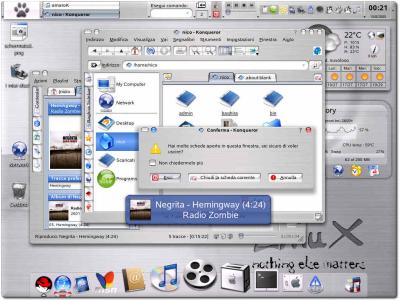
Knowledge is power. More is better. Everything is
recorded, so do not be fooled.
 HERE was a great deal of opposition, particularly from Windows users/advocates, in response to a controversial blog item which I had posted yesterday. Some would consider it nothing but a conspiracy theory, but many signs seem to support my hypothesis. I ought to have elaborated. I discussed the possibility that the American government has a strong relationship with Microsoft and that it may be using this bond for its own benefit in one way or another.
HERE was a great deal of opposition, particularly from Windows users/advocates, in response to a controversial blog item which I had posted yesterday. Some would consider it nothing but a conspiracy theory, but many signs seem to support my hypothesis. I ought to have elaborated. I discussed the possibility that the American government has a strong relationship with Microsoft and that it may be using this bond for its own benefit in one way or another.
Since a bookmark-type submission got knocked off the front page of Digg very quickly, it is clear that too people read what they did not want to believe and reported this as “lame”. In defence of my points, I will address two issues here. Firstly, why do Windows users refuse to accept the idea that their government wants globally-avaliable information to be stored locally, i.e. in the datacentres of American companies? Is it fear that repels the reader? The government has already pulled such data, enlisting the legal power of the Department of Justice to make all companies just give up the fight. Secondly, let me explain why Windows is already the perfect eavesdropping tool, at least when put in the hands of its vendors (and their affiliates).
Some time ago I attempted to explain what it is that makes some Windows users loathe Open Source (including Linux) so vehemently. There are many reasons to use Linux rather than commercially-controlled platforms. Linux is by all means ready for prime time, but that’s not what those who resists it would like you to believe. Even some Linux users might reluctantly show resistance because they fancy the idea of being unique (the ‘RTFM/inferiority complex’ is a possibility too).
Yesterday, in a slightly different context, I received an insightful response from Ian Hilliard, who explained why Linux is being pushed away by so many.
When electricity was first offered to households there was also a great deal of resistance. There was resistance from the gas companies, who saw their market being erroded. There was also a great deal of resistance to ordinary people, who were used to gas. There was the general feeling that gas had done all right up until now, why change.
The gas companies produced FUD about electricity, indicating that if you have electricity it will kill you. Electricity is lethal to touch and it might cause a gas explosion. The whole time, people ignored the number of people who died every year of gas poisoning and all the gas explosions that were already occurring.
When automobiles came out, there was massive resistance to the automobile by the whole industry that had been set up around horses and horse drawn vehicles. Many people were very skilled at riding horses and saw no need to change. The resistance got to the point that it was necessary to have someone walk in front of automobiles with a red flag to warn the public. What the people refused to see is the number of people who died every year in riding accidents or because of horses running amuck.
Like electricity and cars, Linux is a disruptive technology. As such, there will be winners and losers. What has to be expected is that there will continue to be resistance by the losers for some time to come. But, like every other disruptive technology, the as yet unseen technologies that result from Linux will bring massive improvements to our lives.
There is an important point to be taken from the above article. At the moment, many look at Linux as being an alternative to Windows. Just like electricity is not an alternative to gas and the car is not an alternative to the horse, Linux is not an alternative to Windows. It is a replacement for Windows. It is the next generation. It is the future.
Since then (this morning), it has occurred to me that:
- With back doors in Windows 2000/XP/Vista, the US government is making its own dream come become a reality. According to the BBC, it is possible that the British government is already working to get some back door to encrypted filesystems in Windows Vista. This puts in jeopardy one’s files (privacy). But it gets worse.
- Not only do these factors further extend ‘eavesdropping range’ to make eavesdropping workable outside the US (even assuming that no US router is used in the process of packet transmission). The government is slowing down some university networks considerably. This has been confirmed to be the case due to wiretapping, which I imagine raises alarms upon patterns (e.g. sensitive words) being detected. Granted, the government might be able to get a back door to any computer’s filesystem. Assuming the computer is connected and runs Windows, one does not even need to send information down the wire in order to get ‘exposed’. Any Windows user will, by definition, be exposed to intrusion by Microsoft, if not the US government too.
- It also dawned upon me that Internet Explorer 7 was, for some reason, becoming a ‘high priority’ update which would inevitable affect Windows XP users (it does not work with Windows 2000 or earlier versions of Windows). One shallow speculation says that it’s just part of the fight against Firefox and other standards-compliant rivals, but let us look a little deeper. The anti-phishing component of Internet Explorer 7 gives Microsoft a trail of everyone’s behaviour on Web sites. Microsoft has vocally expressed its intention to use this data for refinement of search engine results, which means that data retention will be a part of the deal. So, anyone using IE7 will essentially be watched by Microsoft. Sites; addresses; the whole deal! It’s nothing less than spyware in that respect. Combine this with WGA and the fact that Windows is ‘phoning’ Redmond regularly. This gives IP-to-identity matching. So, if you carry on with Windows, you are merely a peon under the eye of Microsoft and those which it collaborates with. Not only will your activity on the Web be monitored, but so will your files (just potentially, to be on the safe side).
I will close with a grim statement: it is no surprise that the US government turns a blind eye to Microsoft’s fraudulent activities. It even supports Microsoft at national and international level. The government may argue that it needs Windows to be prevalent not only as means of pulling money from all over the world. It could argue that it needs Windows to prevail in order to fight terrorism. That’s the perfect, unbreakable policy to harbour any move that involves jeopardising one’s privacy.
In an age where supervision by governments becomes important, one might wonder if people up above will attempt to altogether ban Open Source or make it penetrable using mandatory ‘binary blobs’. The same flavour of laws already make it a legal offence to backward-engineer proprietary modules like DRM.
I also notice that, contrary to the warnings, there is no massive worm attack, yet. This makes one even more suspicious about overhyped reports that percolated through media sources, from Microsoft.
Correction/update: an exploit is now out. Windows zombie armies are being accumulated as I write this.
In-the-wild attacks against a Windows Server Service vulnerability have started, using malware that hijacks unpatched Windows machines for use in IRC-controlled botnets.
Brace yourself for even more SPAM and distributed denial-of-service attacks.
Update: A new comment on my previous item suggests that France and Germany already sued for NSA spying in Windows.
 have used Ubuntu for about a year, at work. Even though I don’t use it anymore, I’d certainly recommend it. I am saddened to see that many people resent Ubuntu. Even some avid Linux users seem to raise a brow and associate Ubuntu with newbies and moochers. Perhaps its because of its popularity, which sometimes helps obscure the role of GNU and the Linux kernel, especially with people who are informed w.r.t. key background yet happily hop on the Linux bandwagon. That snobbery and resentment could also be attributed to the flocking of some long-time Linux users, who are dazzled by this exciting branch of Debian.
have used Ubuntu for about a year, at work. Even though I don’t use it anymore, I’d certainly recommend it. I am saddened to see that many people resent Ubuntu. Even some avid Linux users seem to raise a brow and associate Ubuntu with newbies and moochers. Perhaps its because of its popularity, which sometimes helps obscure the role of GNU and the Linux kernel, especially with people who are informed w.r.t. key background yet happily hop on the Linux bandwagon. That snobbery and resentment could also be attributed to the flocking of some long-time Linux users, who are dazzled by this exciting branch of Debian.





 Filed under:
Filed under: 

 HENEVER I approach kde-look.org (
HENEVER I approach kde-look.org (
 HERE was a great deal of opposition, particularly from Windows users/advocates, in response to a controversial blog item which I had posted yesterday. Some would consider it nothing but a conspiracy theory, but many signs seem to support my hypothesis. I ought to have elaborated. I discussed the possibility that the
HERE was a great deal of opposition, particularly from Windows users/advocates, in response to a controversial blog item which I had posted yesterday. Some would consider it nothing but a conspiracy theory, but many signs seem to support my hypothesis. I ought to have elaborated. I discussed the possibility that the 
 N elaborate and lateral analysis of a potentially-offensive advertisement has gotten my attention. It perpetuates the myths and confusion over hacker/cracker fallacies and scapegoating. Check out
N elaborate and lateral analysis of a potentially-offensive advertisement has gotten my attention. It perpetuates the myths and confusion over hacker/cracker fallacies and scapegoating. Check out 